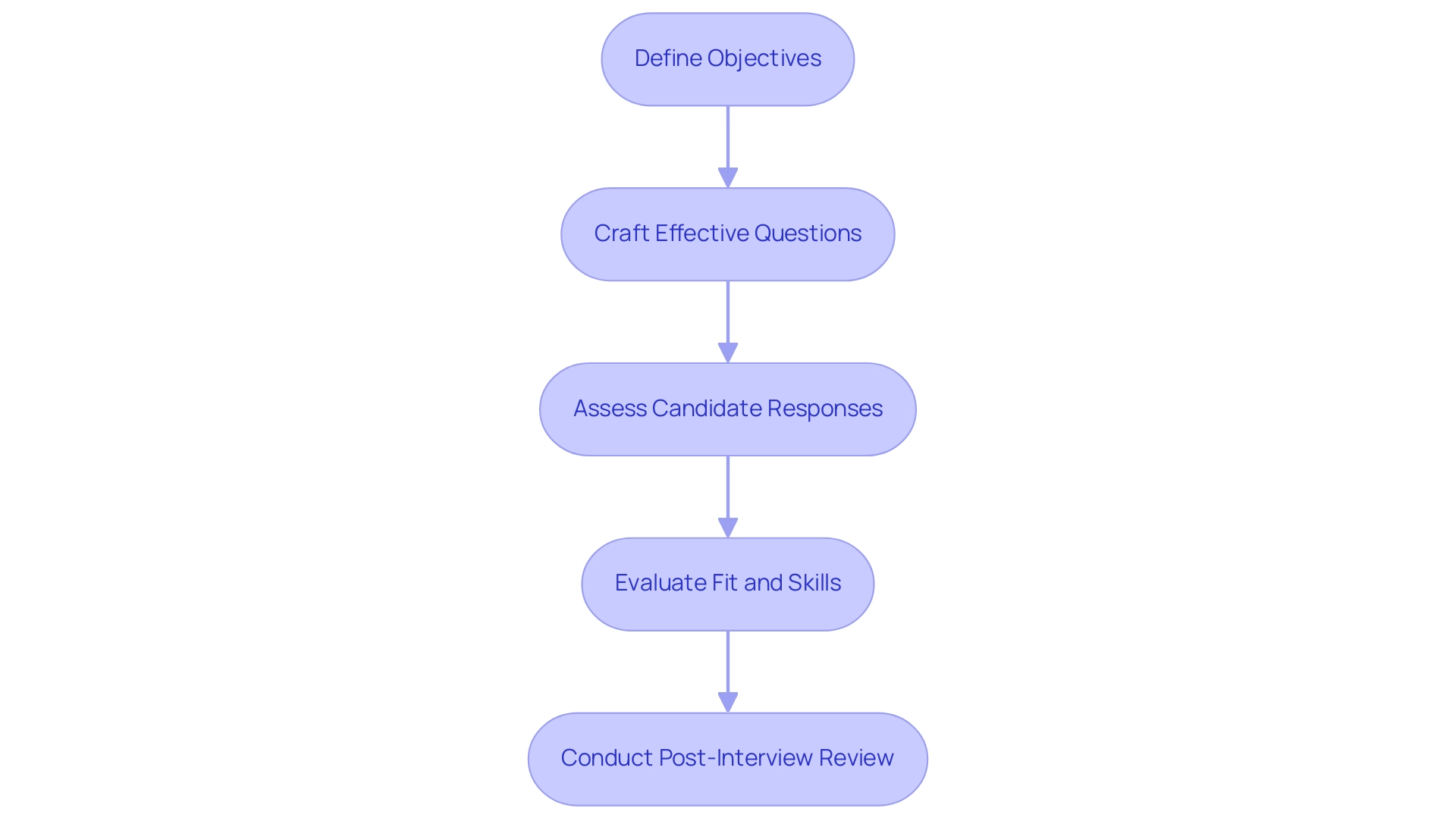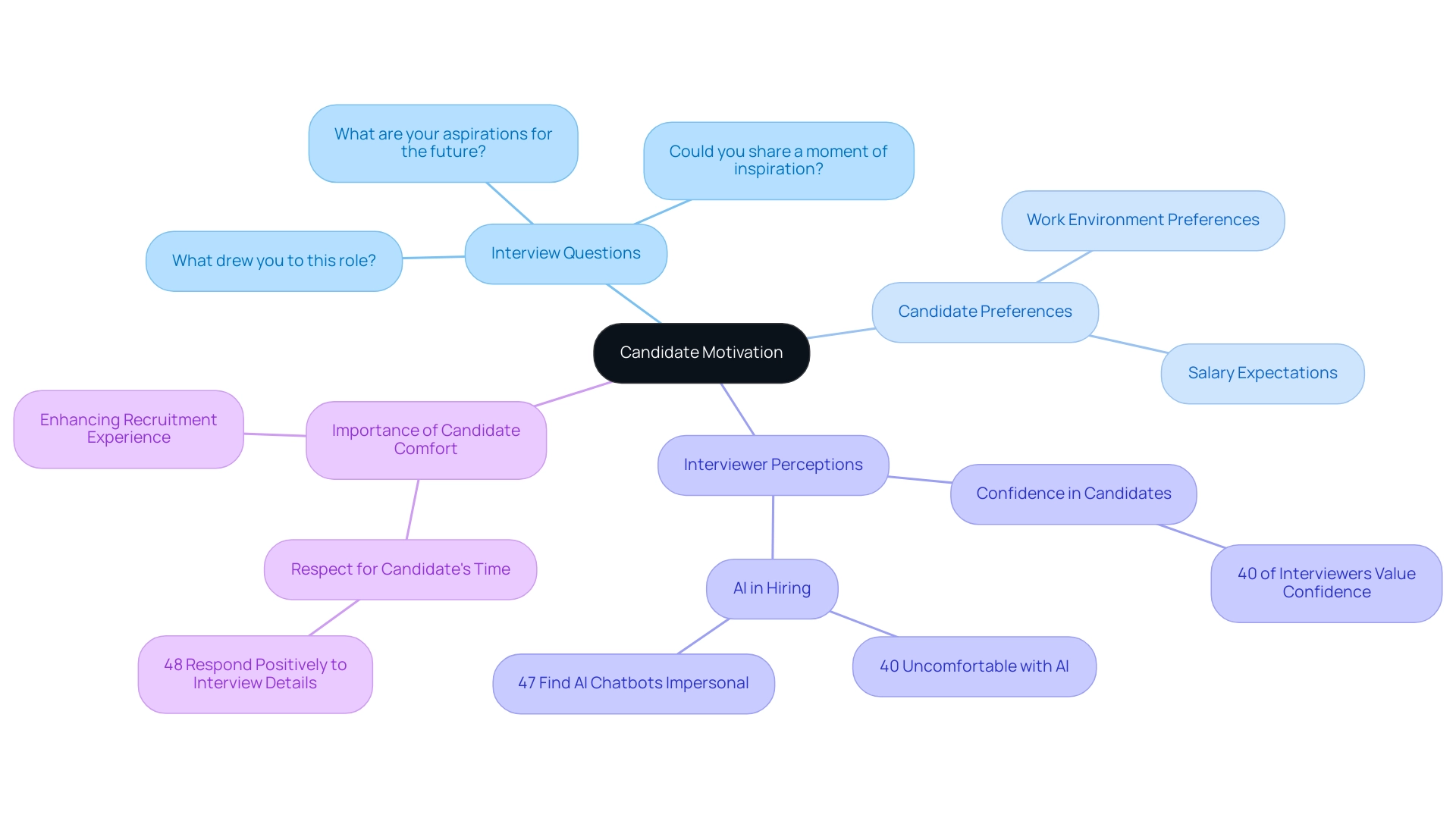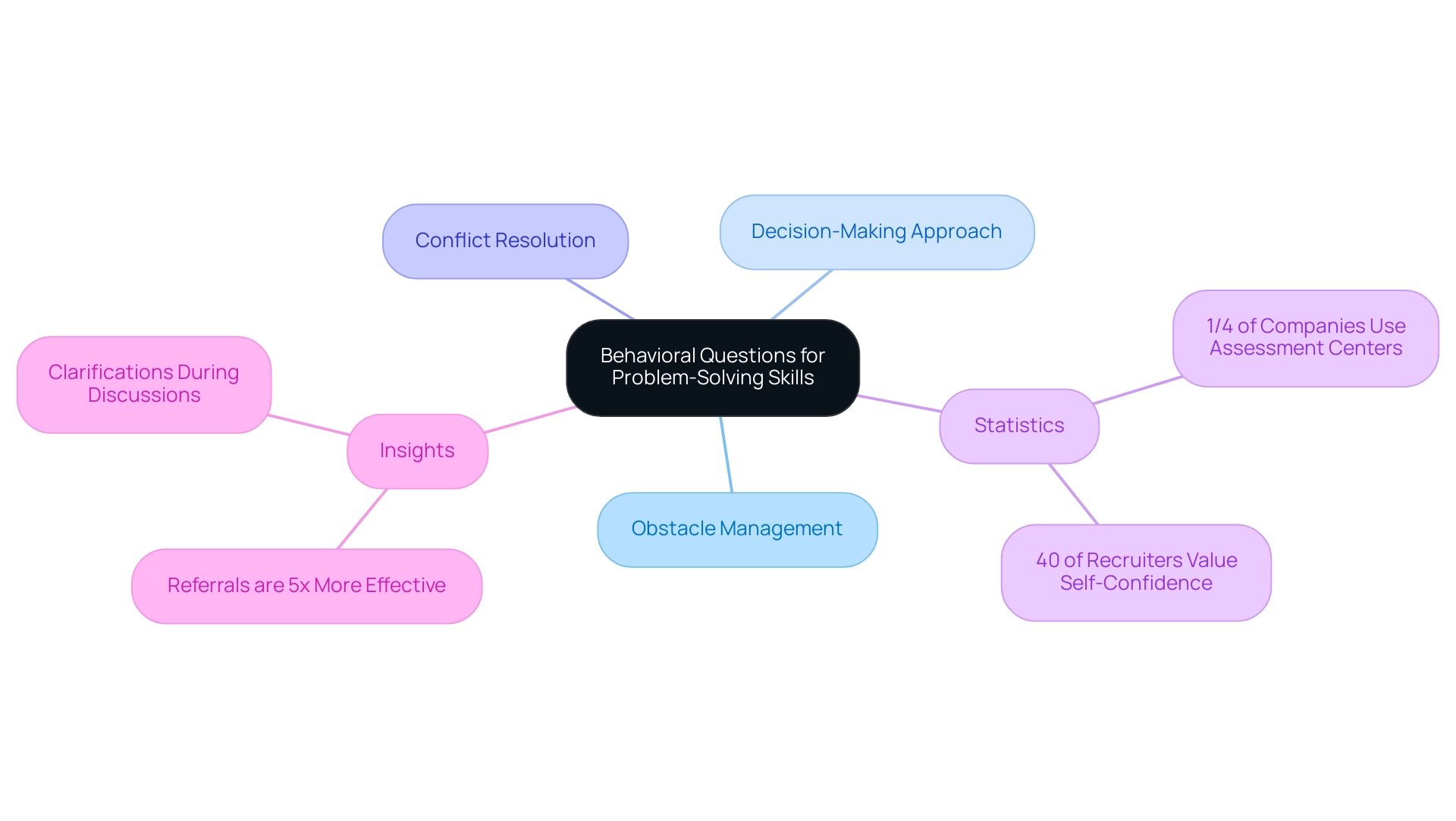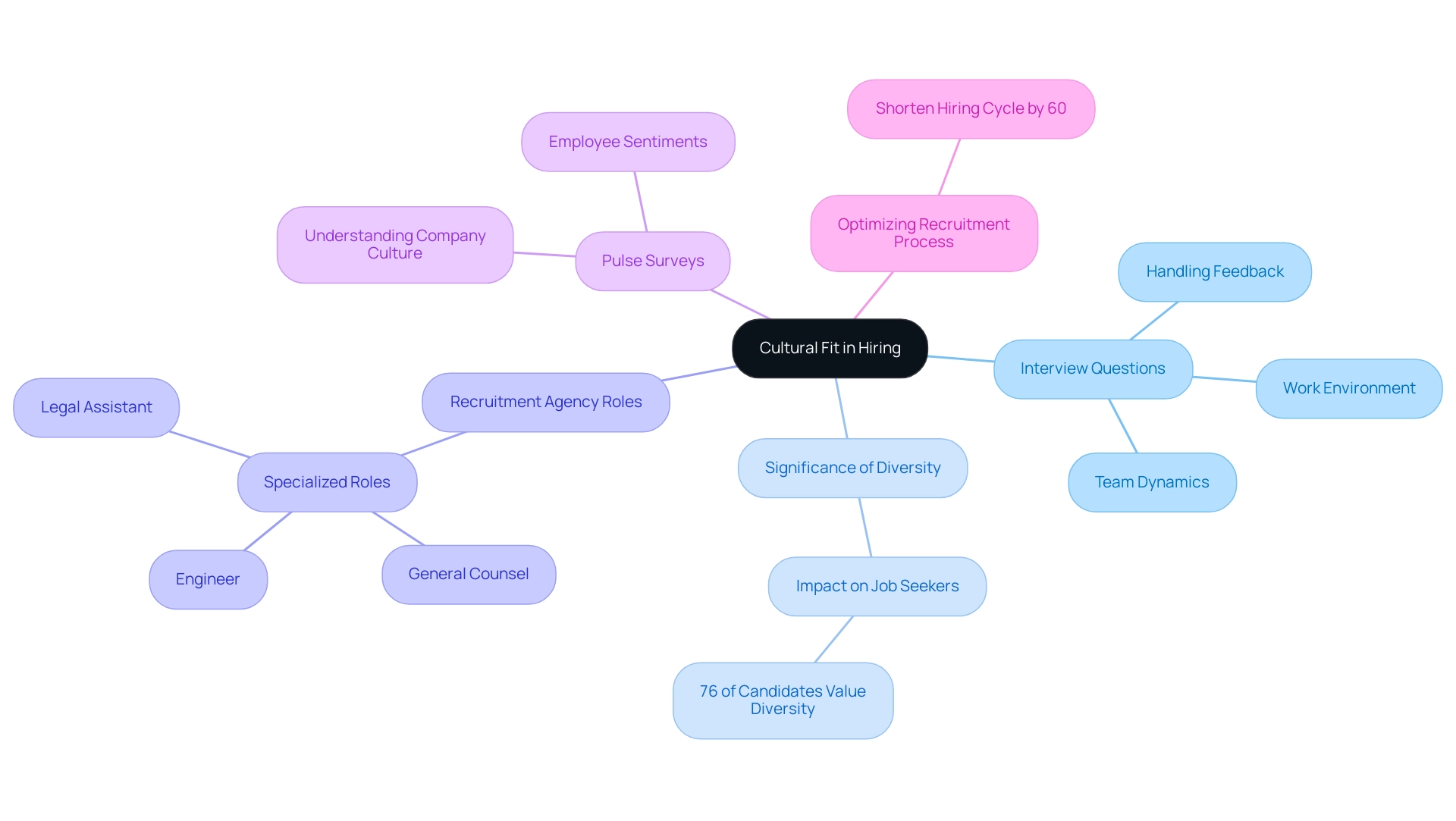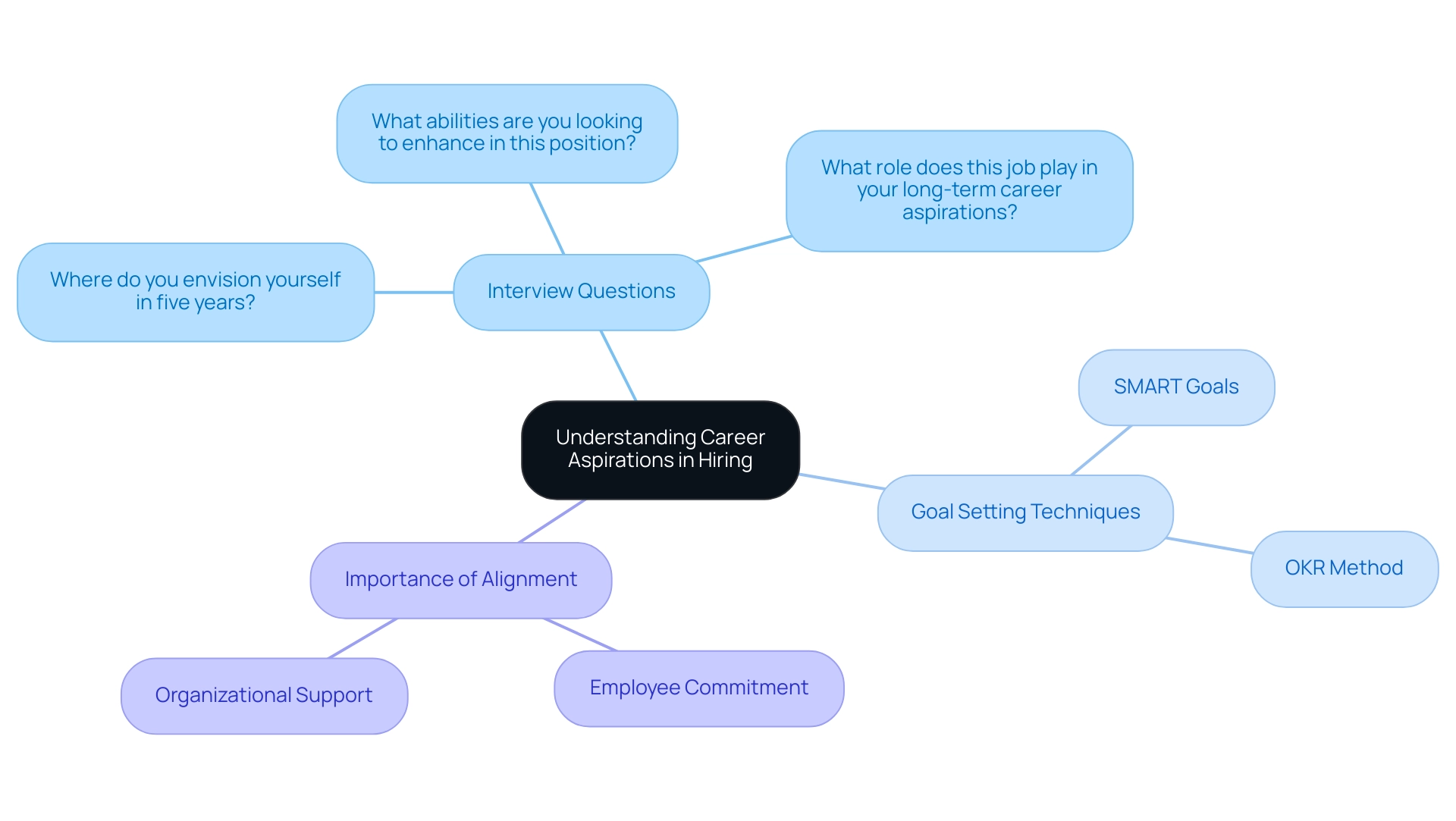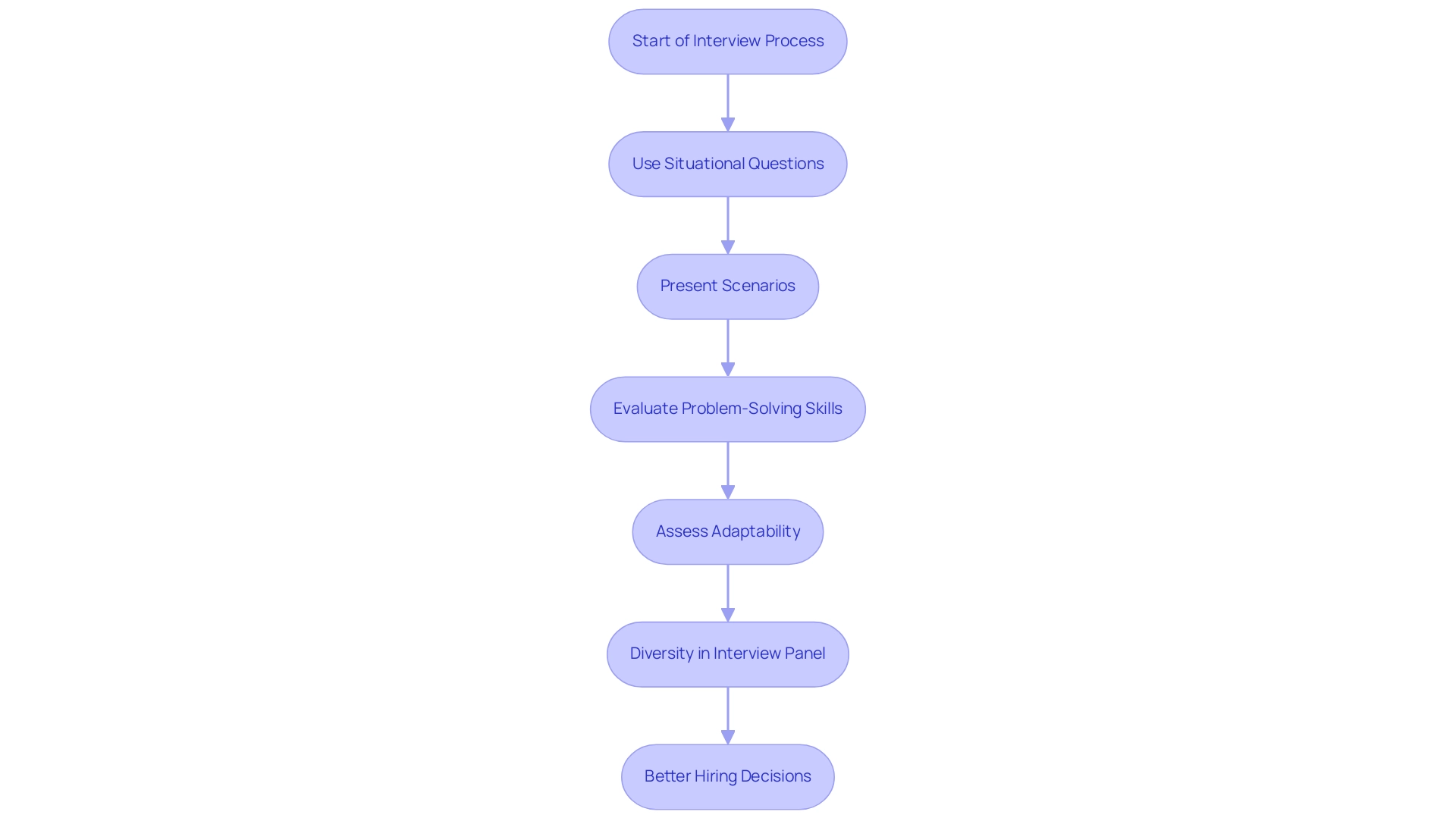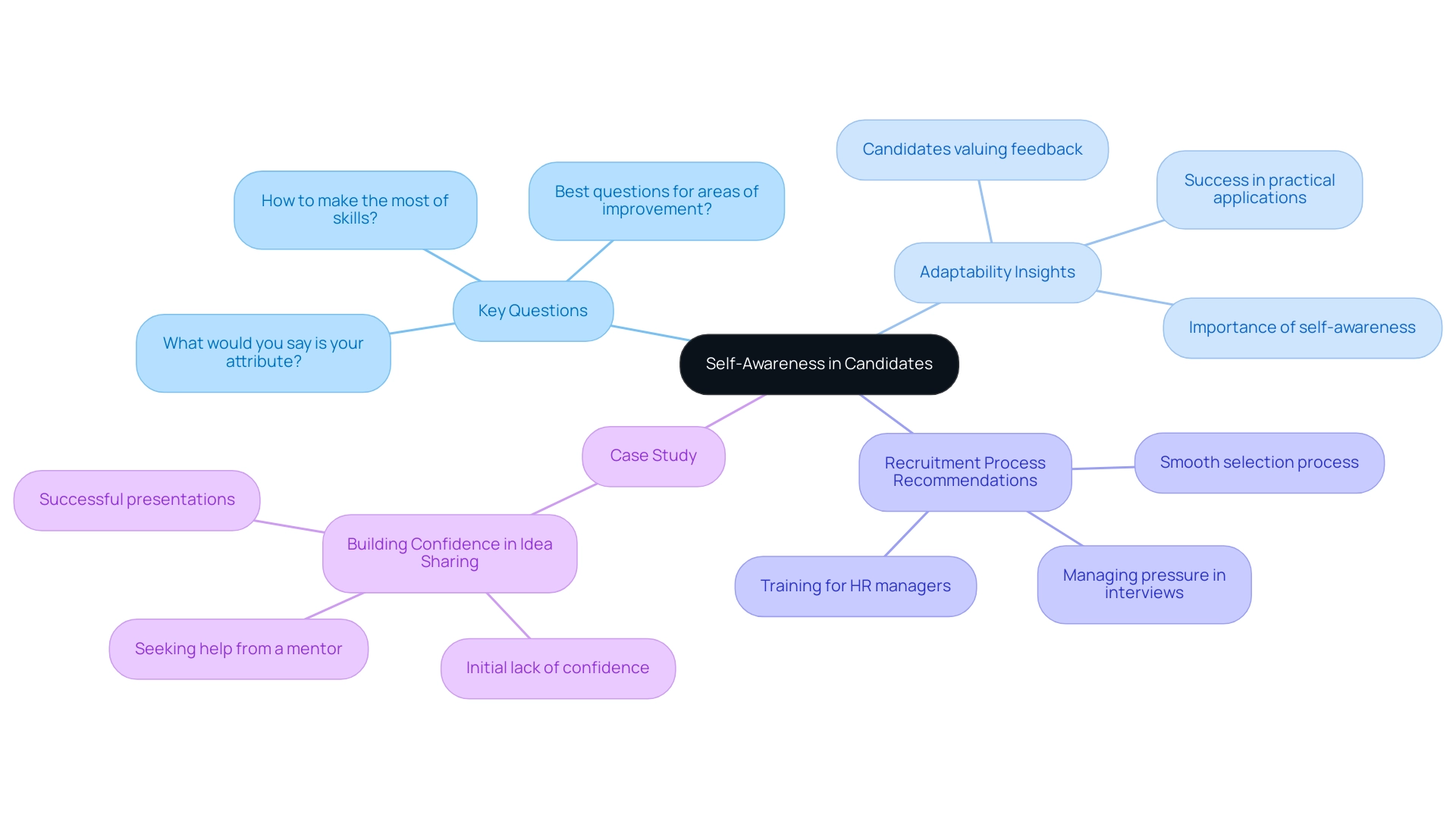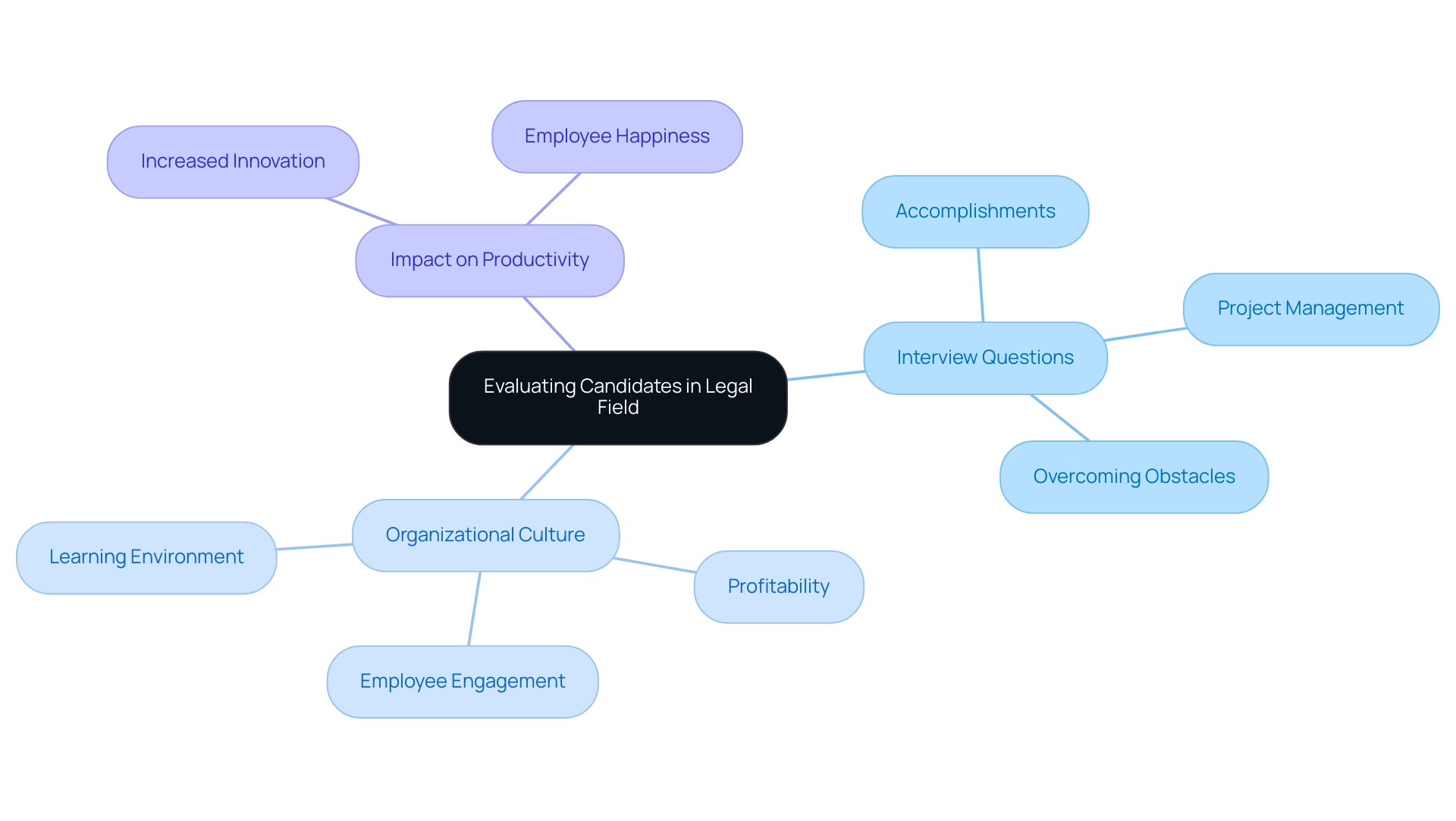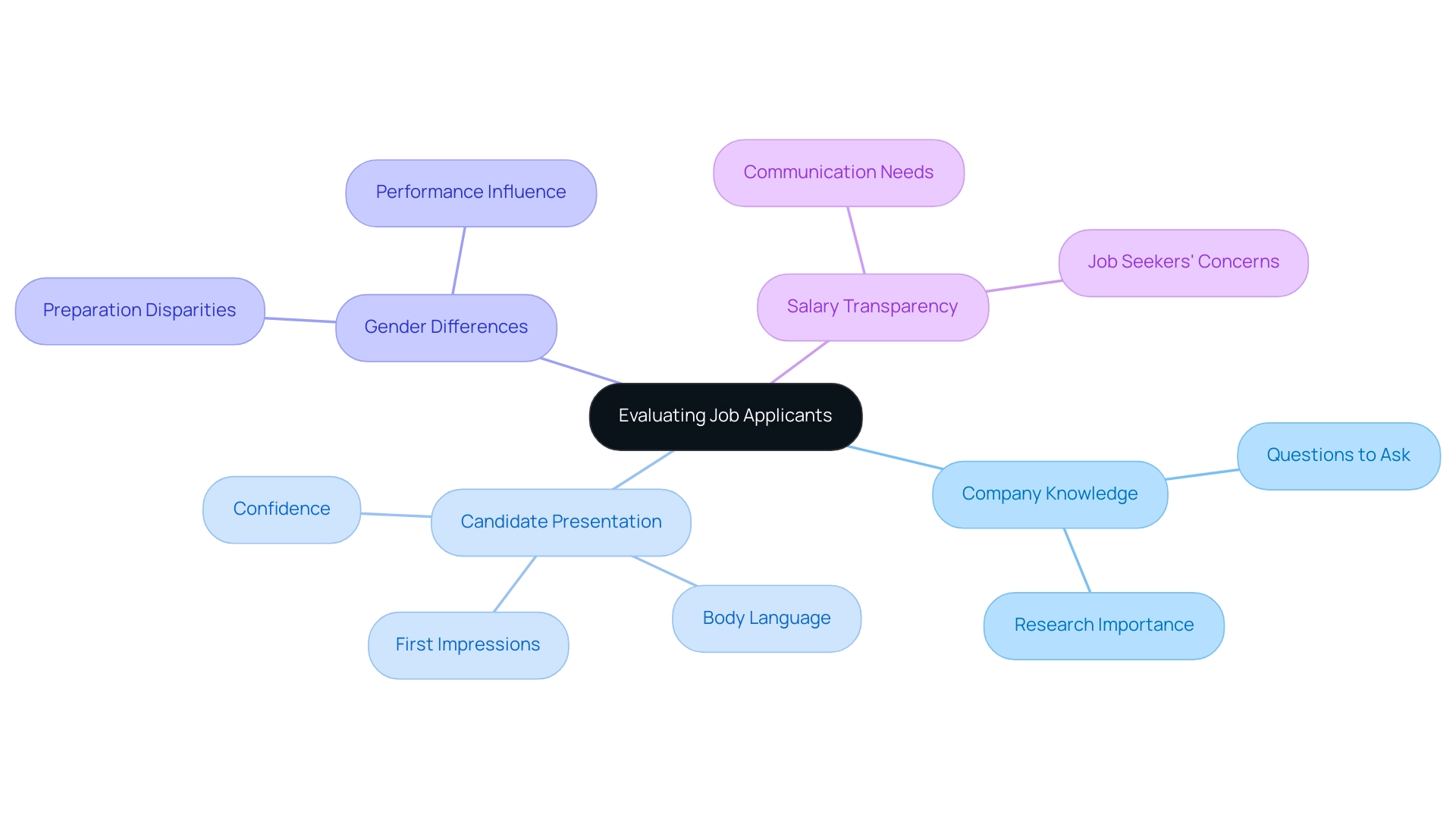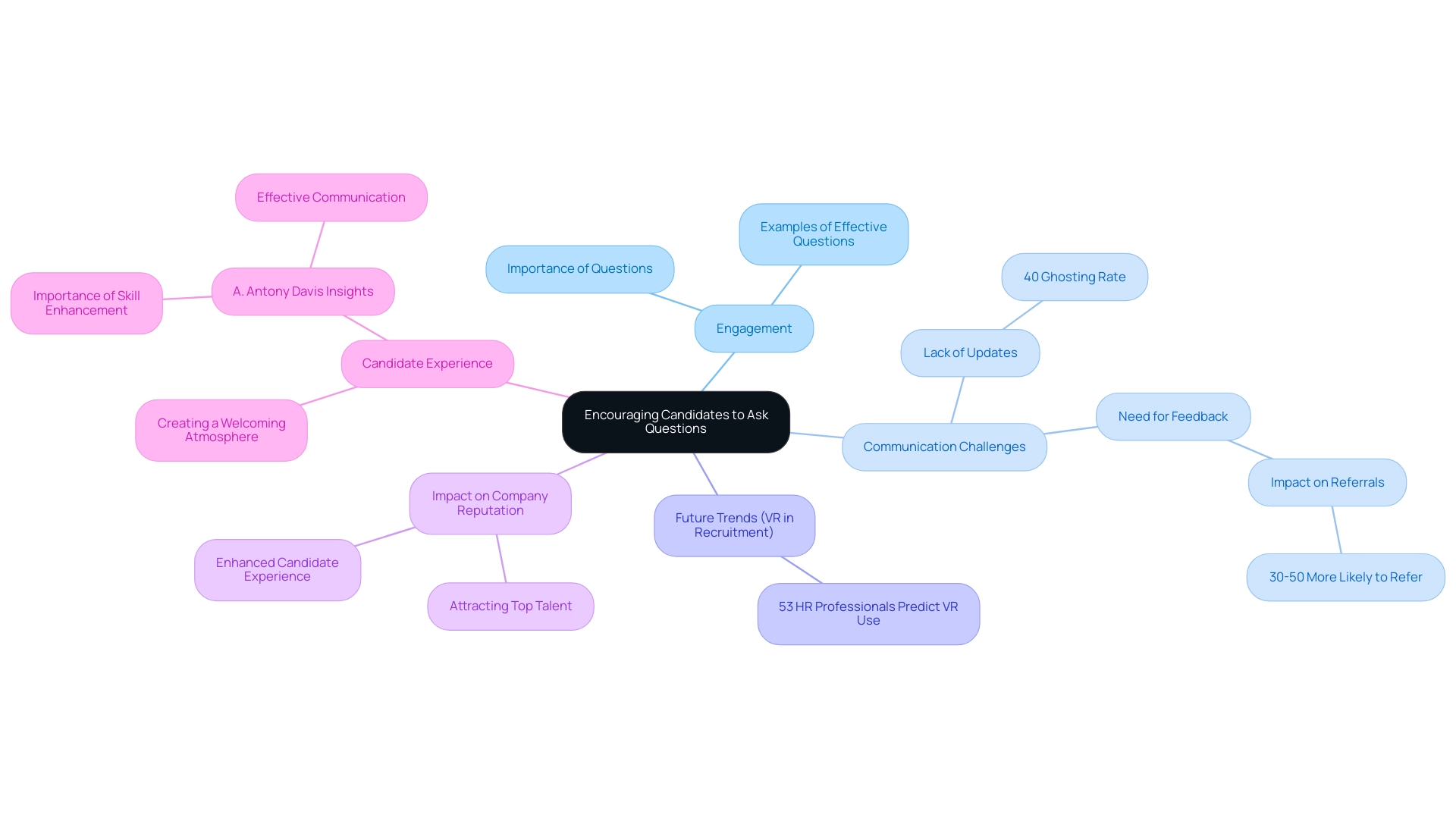Overview
The top 10 best questions to ask an interviewee focus on evaluating candidates’ qualifications, motivations, and cultural fit within an organization. The article supports this by outlining specific types of questions—such as behavioral, situational, and self-awareness inquiries—that provide insights into candidates’ problem-solving abilities, career aspirations, and alignment with company values, ultimately enhancing the hiring process and improving the likelihood of successful hires.
Key Highlights:
- Effective interview questions are essential for evaluating candidates’ qualifications, personality traits, and cultural fit.
- Job seekers assess companies during interviews, making structured and clear communication vital for attracting top talent.
- Asking about motivation and aspirations helps align candidates’ goals with the organization’s objectives.
- Behavioral questions can assess problem-solving skills and adaptability in real-world scenarios.
- Cultural fit questions reveal candidates’ values and their potential interactions within the workplace.
- Understanding candidates’ career goals aids in ensuring alignment with organizational growth opportunities.
- Situational questions gauge candidates’ abilities to handle challenges and assess their confidence levels.
- Self-awareness questions help evaluate candidates’ strengths and areas for improvement, crucial for growth.
- Past experience questions enable candidates to demonstrate their skills and contributions effectively.
- Assessing company knowledge shows candidates’ interest and commitment to the role and organization.
- Encouraging candidates to ask questions fosters engagement and provides insights into their priorities.
Introduction
In today’s field of recruiting new talent for companies or organisations, conducting interviews is now more important than ever before. The questions asked during interviews have an impact on the results of the hiring process as companies aim to attract and keep top tier applicants.
This piece explores the details involved in creating interview questions that not only evaluate candidates’ skills and experiences but also reveal their reasons for applying, problem solving skills, and compatibility with the company culture.
By using questioning strategies and creating a welcoming interview atmosphere, businesses can improve their hiring procedures by attracting candidates who share their values and can impact their goals in a positive way.
Whether dealing with the challenges of interviews or recognising the significance of candidate satisfaction, this resource provides useful advice for HR professionals looking to enhance their recruitment strategies in today’s ever changing job landscape.
1. The Importance of Effective Interview Questions
Formulating the best questions to ask an interviewee is crucial to uncover a candidate’s genuine capabilities and fit within a company. Not only do these questions evaluate qualifications, but they also shed light on aspects like personality traits and work values. In today’s job market, where talent is highly sought after, it’s vital to ensure that the selection processes run smoothly and are properly structured.
Job seekers are carefully assessing your business just as you are assessing them—keeping an eye out for warning signs during the interview process, like schedule changes and confusion or disorderliness in communication. Using crafted questions and steering clear of common mistakes helps interviewers to have more meaningful conversations, allowing them to determine the best questions to ask an interviewee to effectively grasp the applicants’ drive and skills while maintaining clear and consistent communication. This approach contributes to creating a favorable experience for applicants and boosting the chances of attracting top-notch talent.
Recent data has shown that top-notch individuals usually switch to roles in as little as a ten-day time frame, which highlights the importance of promptly utilizing effective questioning methods. Moreover, it is crucial to address glitches during virtual discussions as they may cause interruptions, especially in areas like sound quality. Both applicants and recruiters should ensure their equipment is in working order and opt for platforms to reduce such disruptions.
Ultimately, by asking the best questions to ask an interviewee thoughtfully and establishing a professional and inviting setting, HR managers can significantly enhance their likelihood of making successful hires. It’s important for HR managers to actively assess and enhance their interviewing practices to attract and keep individuals who will add value to their objectives positively.
2. Questions to Understand Candidate Motivation
When assessing an individual’s motivation and enthusiasm thoroughly, it’s essential to ask enquiries that delve into their aspirations and inspirations completely. Make sure to include the best questions to ask an interviewee during the interview process:
- “What drew you to this role?”
- “What are your aspirations for the future in your career?”
- “Could you share a moment from work when you felt most inspired?”
These questions provide insights into what drives applicants while also assisting interviewers in evaluating how well their ambitions align with the company’s core principles and objectives. It is important to be open and transparent throughout this process so that applicants feel at ease sharing their preferences for how they like to work, whether they prefer a mix of working from home and coming into the office or remote work, as well as their salary expectations.
If an applicant has feelings about how they want to work and why it matters to them personally and professionally to have those preferences met while ensuring effective communication and collaboration with their team.
Studies indicate that nearly half of applicants react positively when provided with interview details in advance, which emphasises the importance of respecting their time and enhancing their interview experience. A recent study has shown that many job seekers are not entirely comfortable with the idea of AI being involved in the hiring process – with 40 percent expressing unease and 47 percent finding AI chatbots lacking a touch. This highlights the necessity for organisations to achieve a balance between employing automation and sustaining relationships to ensure that applicants feel valued and acknowledged.
It’s also interesting to note that 40 percent of interviewers believe that an applicant’s confidence plays a role in their hiring decisions – highlighting the importance of understanding what drives individuals during the selection process. Ultimately, understanding why applicants are motivated by asking the best questions to ask an interviewee allows companies to make well-informed hiring decisions that enhance both employee satisfaction and alignment with company goals. Keep in mind that actively engaging with applicants will not just enhance the recruitment process but also guarantee a match, for both the individual and the organisation.
3. Behavioral Questions to Assess Problem-Solving Skills
The best questions to ask an interviewee include behaviour based interview queries that are essential for assessing candidates’ problem solving skills and flexibility, aiming for thorough responses:
- Share a time when you encountered a major obstacle at work and discuss how you managed it.
- Narrate an instance where you were required to make a decision and elaborate on your approach.
- Could you recount a scenario showcasing how you successfully resolved a disagreement with a coworker?
Candidates are often asked to share experiences in response to the best questions to ask an interviewee, providing insight into how they approach and handle difficult situations in real life scenarios. Statistics show that one quarter of major companies use assessment centres that emulate actual work environments for evaluations; this indicates a growing preference for practical assessments in recruitment processes. Furthermore, a considerable 40% of recruiters acknowledge that an applicant’s self-confidence can greatly influence hiring decisions, emphasising the necessity for applicants to thoroughly prepare and align their responses with data from assessments to enhance their likelihood of success.
According to a quote I saw online at LinkedIn recently mentioning that referrals tend to be more effective than methods of hiring by a factor of five underscores the significance of utilising personal connections in the recruitment process effectively. By seeking clarification during discussions can assist recruiters in evaluating applicants’ problem-solving skills, which can provide insights into their potential performance in the position.
4. Questions to Determine Cultural Fit
When conducting interviews to assess compatibility effectively, it’s important to use the best questions to ask an interviewee that delve into applicants’ values and their interactions within a work environment. For instance:
- What kind of work environment motivates you the most?
- How do you handle feedback and critique?
- Can you share an example of a time when you helped shape team dynamics?
These questions not only provide insights into individuals’ perceptions of and engagement with workplace culture but also ensure that their values align with those of your organisation. Recognising the significance of diversity to 76% of job seekers emphasises the need for organisations to understand nuances better regarding hiring practices. This data highlights the importance of organisations being aware of their diversity initiatives as they influence individuals’ decisions.
Moreover, relying on recruitment agencies can improve your interviewing procedures, especially for specialised roles, like General Counsel, Engineer, and Legal Assistant. These firms excel in providing recruitment services across different sectors. Pulse surveys are useful for understanding how employees feel about the company culture and can provide valuable insights for hiring decisions to be made more effectively based on input from Rebekkah Smith, who specialises in managing small businesses. She noted that how individuals engage with a team can indicate their suitability for long-term roles and employee retention prospects.
Asking the best questions to ask an interviewee that focus on cultural compatibility and adopting personalised recruitment techniques can streamline the hiring process by up to 60% and contribute to a harmonious workplace atmosphere.
5. Questions About Career Goals and Aspirations
When conducting interviews to understand candidates’ career aspirations and manoeuvre through the talent pool effectively, you might want to pose these queries:
- “Where do you envision yourself in five years?”
- “What abilities are you looking to enhance in this position?”
- “What role does this job play in your long-term career aspirations?”
During discussions with individuals, inquiring about your goals provides us insight into what you’re aspiring to and assists us in determining if your career ambitions align with what our organisation can provide to support your professional growth – a truly significant link to establish! Research actually shows that when people set goals that are tough but reachable, it can boost their performance by a whopping 90%. It’s interesting to note that around 83% of organisations suggest using the OKR method to align their goals and achieve better results – so ensuring everyone’s on the same page with their objectives is significant in our hiring process.
It’s important to keep in mind that top candidates are actively looking into job opportunities and are searching for roles that not only fit their expertise but also resonate with their career aspirations and principles in the long run. Candidates should be careful about accepting the initial job offer they get, as this might result in disappointment if they find better options later down the line. According to Giovanni—a serving Account Manager and SEO Consultant—achieving success doesn’t come from any hidden formula or shortcut.
- Put in the effort consistently.
- Stay adaptable; don’t hesitate to reach out for guidance when necessary to cultivate a sense of commitment among employees that aligns with the company expansion goals.
By using methods for setting goals effectively, like dividing big goals into SMART goals, companies can create a system that tracks progress and recognises accomplishments to motivate employees in their professional journeys even more profoundly.
Managing insights from real-world examples such as ‘Maximising Goal Setting Data for Success’ can provide a framework for applying these strategies to ensure a tailored and engaging hiring experience. Ensuring a conducted selection process is crucial in retaining outstanding individuals and necessitates organisations to demonstrate patience and support while acknowledging the significance of this choice for all parties involved.
6. Situational Questions for Real-World Application
During assessments for legal roles, evaluators frequently depend significantly on situational enquiries, regarded as the best questions to ask an interviewee, to gauge the individuals’ capabilities in managing challenges efficiently. These enquiries typically involve presenting scenarios like:
- How would you manage a situation, with deadlines and limited resources?
- If you encounter a client scenario; what actions would you take to address their concerns?
Picture yourself in charge of a project that is lagging behind schedule. During discussions, employers can learn more about an applicant’s problem-solving abilities and adaptability by using the best questions to ask an interviewee about actions to be taken in certain scenarios. This approach helps gauge how individuals manage challenging situations and assesses their self-assurance levels—an aspect supported by studies showing that 40% of interviewers believe an applicant’s confidence significantly influences hiring decisions.
In the finance sector specifically, hiring recruitment agencies for personalised searches ensures that questions are tailored to the distinctive requirements of positions such as General Counsel and Legal Secretary. These services collaborate with companies to develop scenario-based questions that reflect the challenges faced by legal experts in the finance sector. Additionally, individuals may be expected to discuss examinations such as Fisher’s exact test, within the context of variance analysis.
A subject that carries importance in the financial domain. Forming a selection team can enhance the effectiveness of these evaluations by encouraging fairness and minimising bias. One example is the study titled ‘The Significance of Diversity and Inclusion during Interviews’ which demonstrates how having a varied interview panel can improve recruitment results and attract applicants while fostering creativity and enhancing overall efficiency.
By utilising the best questions to ask an interviewee and adhering to suggested protocols—such as ensuring all panelists are proficient in unbiased interviewing techniques—companies can assess applicants’ problem-solving skills in real-world scenarios more efficiently, leading to better hiring decisions in the end. For information on how tailored searches can improve your hiring procedures feel free to get in touch with us.
7. Questions About Strengths and Weaknesses
When evaluating a candidate’s self-awareness and potential for growth, in today’s talent market it’s beneficial to pose the following insightful inquiries:
- “What would you say is your attribute?”
- “What do you think are the best questions to ask an interviewee regarding areas for improvement?”
- “What are the best questions to ask an interviewee regarding how they make the most of their skills in their job?”
Candidates can use these questions to reflect on their skills and discover methods to enhance themselves during the assessment process—a tip shared by Stav from The Muse who used to work as an editor there!
Being aware of both strengths and weaknesses can assist individuals in performing better in discussions according to research findings. The study also shows that those who recognize where they need improvement tend to be adaptable and open to feedback—qualities that are highly sought after in today’s competitive talent market.
It’s essential to ensure that the selection process is smooth and well managed by hiring managers because applicants are evaluating your company as much as you are evaluating them. If the selection process isn’t handled effectively, there’s a chance of losing top talent to competing firms. Applicants look for warning signs like disorganization or lack of interest from interviewers, which can indicate a cultural fit.
For instance, take the scenario described in the case study “Boost Your Confidence in Sharing Ideas” where a job seeker had difficulties presenting ideas at first because of feeling unsure of themselves. Through seeking advice and doing exercises with a mentor, they improved their method and were eventually acknowledged for their input.
These instances emphasize how being self-aware during discussions provides a sense of an individual’s potential for growth and ability to thrive in group environments. Furthermore, data indicates that individuals who have created materials and layouts for marketing campaigns related to pharmaceuticals and fitness gear have shown significant success demonstrating their ability to adapt and apply their skills in practical situations—a crucial aspect in a competitive environment.
To enhance your recruitment efforts more effectively and efficiently, assist HR managers in evaluating self-awareness during high-pressure situations through specialized training resources designed for managing stress in data analytics assessments and responding skillfully to unexpected outcomes.
8. Questions About Past Experiences and Achievements
To evaluate applicants’ experiences in the demanding legal field – especially for specialised roles like General Counsel or Attorney – it’s beneficial to incorporate the best questions to ask an interviewee during interviews. Some examples are:
- “Could you share an accomplishment from your legal career?”
- “Tell me about a project you managed in your last legal position and its impact.”
- “What obstacles have you successfully navigated in your journey?”
Candidates can use the best questions to ask an interviewee not only to highlight their skills but also to demonstrate how their background could benefit your organisation’s growth and enhance workplace happiness.
An essential aspect for keeping employees engaged and loyal in today’s competitive job market where top candidates have choices is crucial. It is important to adopt a recruitment strategy that involves tailored searches specific to your organisation’s requirements based upon industry and location needs amidst the current talent landscape. Studies suggest that firms fostering a learning environment are significantly inclined towards innovation, by 92%, leading to a 52% increased productivity rate.
It’s important to hire individuals who excel in these kinds of environments, and organisations with a culture of learning tend to be 17% more profitable than others according to a study called ‘Learning Culture and Business Success.’ Dr. Jim Harter from Gallup emphasises the significance of acknowledging an individual’s achievements in forming a dedicated team. By emphasising accomplishments when evaluating individuals for positions within your organisation’s framework and goals, it effectively fosters an atmosphere of recognition known to enhance employee morale and satisfaction by 86%.
This effect is especially pronounced when recruitment methods acknowledge the accomplishments of potential hires upfront. Additionally, ensure that the recruitment team conducts interviews smoothly to prevent missing out on talent.
9. Questions to Assess Company Knowledge and Interest
To effectively evaluate an applicant’s awareness of your organisation while encouraging transparency and authenticity, you might consider the best questions to ask an interviewee; these inquiries will demonstrate the individual’s comprehension, interest in the position, and commitment to researching your establishment. Job applicants who openly share their reasons for applying to a position and their work preferences alongside salary expectations and personal situations not only establish credibility but also boost their prospects of making a positive impression with employers during the hiring process. Enough statistics indicate that 1 in every 5 interviewees is chosen for the job they applied for; therefore it is vital to differentiate between individuals who genuinely show interest in the job and those who might not be as ready or committed.
When making hiring decisions, first impressions play a role and are usually influenced by how a candidate looks and presents themselves confidently, with their body language being key factors to consider, which stresses the importance of candidates being prepared and genuine during their interactions. Sufficiently, there are inconsistencies in how ready individuals are based on gender, as indicated by a study showing that 73 percent of women feel the need to thoroughly investigate the organisation and arrive with inquiries compared to 66 percent of men. This suggests that women may experience a stronger desire to demonstrate their abilities during evaluations, which could influence their performance and assessment.
Furthermore, in today’s job market, individuals seeking employment face pressure, with half of them indicating the lack of salary transparency and frequent changes in schedules as primary concerns. This highlights the significance of organisations fostering open communication. Candidates who possess a clear understanding of the establishment and know the best questions to ask an interviewee regarding compensation and job conditions are more likely to succeed in discussions and demonstrate better alignment with the organisation’s values.
Engaging in dialogues can also aid in building a connection, as job seekers can share the influence of their previous experiences on their career growth and how it steers them in making considered decisions regarding job opportunities.
10. Encouraging Candidates to Ask Their Own Questions
It’s important to encourage applicants to ask the best questions to ask an interviewee during an interview, as it helps create engagement and clarity in the process. Using phrases like “What would you like to know?” or “Is there anything specific you want to inquire about the position or the organisation?”
Empowers individuals to share their queries and encourages a meaningful exchange of information. Moreover, inquiring about any worries related to this role enables applicants to voice their reservations, giving interviewers a deeper understanding of their priorities.
This engaging method not only enhances the selection process as a whole but also has a substantial effect on the company’s reputation—particularly considering the anticipated global scarcity of skilled workers that is expected to result in more than 85 million unfilled positions in 2030. Ensuring an experience for applicants is now crucial more than ever. Additionally, over half of HR experts predict that virtual reality (VR) will be commonly used in job assessments within the next five years—suggesting a trend toward more interactive and immersive evaluation techniques.
Moreover, it is crucial to address recruitment challenges like lack of organisation and unclear communication to attract top talent. A study on applicant interactions highlights that most individuals value receiving updates on their application status; however, a significant 40% have experienced being left in the dark post-interview. Offer responses can greatly enhance the applicants’ journey since individuals who receive quick communication are 30 to 50 percent more inclined to recommend others to the organisation—an indication of the lasting advantages of focusing resources into interactions during recruitment.
A Data Analyst named A. Antony Davis from HEALING SPRINGS MED CARE LLC underscores that efficient communication and skill enhancement play roles in today’s hiring environment. Creating a welcoming atmosphere for candidates to openly discuss their inquiries and issues will enable companies like Boutique Recruiting to ask the best questions to ask an interviewee, thereby enhancing communication and establishing an image that attracts top-tier talent seekers. For optimising your recruitment procedures and captivating the qualified applicants, get in touch with Boutique Recruiting now!
Conclusion
Creating interview questions is crucial for any company aiming to attract and keep top notch professionals on board. The article emphasises the importance of crafted questions that not only evaluate candidates’ abilities but also explore their drive for work and problem solving skills as well, as how they fit in with the company culture. By employing questioning strategies and cultivating a friendly interview atmosphere, organisations can improve their hiring procedures and ensure candidates have a positive experience during the process.
It’s important to figure out what motivates candidates and how their values match up with those of the company – that’s key! By posing the questions – touching on things like what drives them and where they see themselves in their careers to their strengths and past roles – companies can get a good sense of who they’re hiring and make better decisions about it all. Moreover, including questions that focus on behaviour and situations lets interviewers gauge how candidates solve problems, in settings making sure they get a clear picture of what the candidates are capable of.
In the end, the main aim of the interview process should be to establish a conversation that is beneficial for both the applicant and the employer. Inviting candidates to pose their queries promotes involvement and shows a dedication to openness, which is becoming more crucial in today’s tough labour market. By emphasising communication and ensuring candidate contentment, organisations can enhance their recruitment results and develop a reputation that draws in top tier talent. In the changing realm of recruitment practices, it will be crucial for companies to embrace these strategies in order to succeed in the future.
Frequently Asked Questions
Why is it important to formulate the best questions to ask an interviewee?
Formulating the best questions is crucial to uncover a candidate’s genuine capabilities and fit within a company. These questions evaluate qualifications and reveal personality traits and work values.
What should interviewers be aware of during the interview process?
Interviewers should be aware that job seekers are also assessing the company. They should look out for warning signs such as schedule changes and disorderly communication.
How can structured questioning enhance the interview process?
Using crafted questions and avoiding common mistakes allows for more meaningful conversations, helping interviewers understand applicants’ drive and skills while maintaining clear communication.
What is the significance of addressing glitches during virtual interviews?
Addressing glitches, such as sound quality issues, is essential as they can cause interruptions. Both applicants and recruiters should ensure their equipment is functional to minimize disruptions.
What are some effective questions to assess an applicant’s motivation and enthusiasm?
Effective questions include: 1. ‘What drew you to this role?’ 2. ‘What are your aspirations for the future in your career?’ 3. ‘Could you share a moment from work when you felt most inspired?’
How can interviewers respect applicants’ time and enhance their experience?
Providing interview details in advance can positively impact applicants’ comfort levels and overall experience during the interview.
What are applicants’ views on AI involvement in the hiring process?
Many job seekers express discomfort with AI in hiring, with 40% feeling uneasy and 47% finding AI chatbots lacking a personal touch, highlighting the need for a balance between automation and personal interaction.
How does an applicant’s confidence affect hiring decisions?
About 40% of interviewers believe that an applicant’s confidence plays a significant role in hiring decisions, emphasizing the importance of understanding what drives candidates.
What types of questions are essential for assessing problem-solving skills?
Essential behavioral-based interview questions include: 1. Share a time when you encountered a major obstacle at work and how you managed it. 2. Narrate an instance where you were required to make a decision and elaborate on your approach. 3. Recount a scenario showcasing how you resolved a disagreement with a coworker.
What role do referrals play in the hiring process?
Referrals can be significantly more effective than other hiring methods, underscoring the importance of utilizing personal connections in recruitment.
